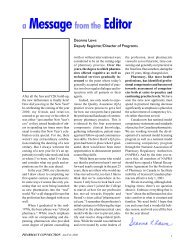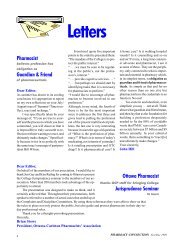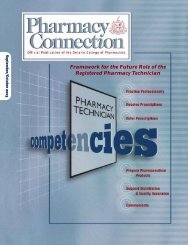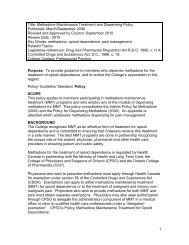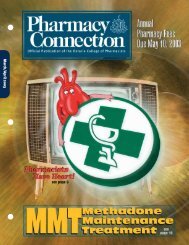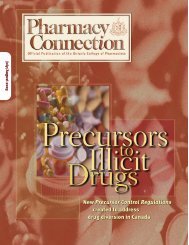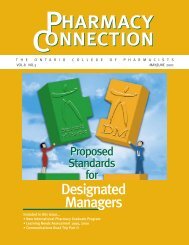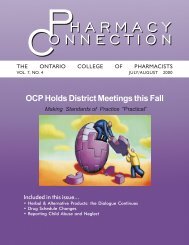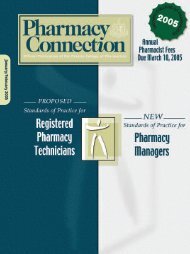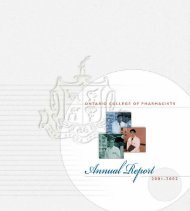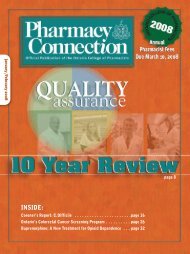collaborative practice collaborative practice - Ontario College of ...
collaborative practice collaborative practice - Ontario College of ...
collaborative practice collaborative practice - Ontario College of ...
Create successful ePaper yourself
Turn your PDF publications into a flip-book with our unique Google optimized e-Paper software.
legal matters<br />
Canada (particularly in <strong>Ontario</strong>) to promote its business.<br />
Yet, the enterprise had avoided any accountability to<br />
the <strong>Ontario</strong> regulatory <strong>College</strong>.<br />
Two <strong>of</strong> the regulatory requirements that the enterprise<br />
did not comply with were a requirement for a<br />
physician’s prescription (a photograph <strong>of</strong> a pill bottle<br />
was sufficient) to support the sale and the fact that<br />
the enterprise provided automatic refills every three<br />
months without further authority for dispensing. The<br />
regulatory <strong>College</strong> viewed these as examples <strong>of</strong> the<br />
safety risks associated with the enterprise.<br />
The Court first dealt with the issue <strong>of</strong> whether the<br />
regulatory <strong>College</strong> had jurisdiction over the activities <strong>of</strong><br />
the <strong>Ontario</strong> call centre. Not every entity with a glancing<br />
connection to <strong>Ontario</strong> is subject to the requirements<br />
<strong>of</strong> an <strong>Ontario</strong> regulator. The Court found that there<br />
were two ways in which the <strong>Ontario</strong> regulator could<br />
have jurisdiction:<br />
1. Where the entity had a sufficient connection to<br />
<strong>Ontario</strong> in terms <strong>of</strong> its operation <strong>of</strong> the regulated<br />
pr<strong>of</strong>ession or industry. This requires an analysis <strong>of</strong><br />
both the enabling legislation (as to what it is intending<br />
to protect) and the substance <strong>of</strong> the activities <strong>of</strong><br />
the entity.<br />
2. Where the entity was an agent <strong>of</strong> another entity<br />
that was, in fact, practising the pr<strong>of</strong>ession or operating<br />
the industry in <strong>Ontario</strong>.<br />
The Court found that both tests were met in this case.<br />
In substance the call (and processing) centre was not<br />
simply providing clerical services; it was operating a<br />
pharmacy in <strong>Ontario</strong> in conjunction with the Belize<br />
company. In addition, the call centre was acting as an<br />
agent for the Belize company in its attempt to remotely<br />
operate a pharmacy in <strong>Ontario</strong>. In making those<br />
findings the court was quite prepared to look behind<br />
the <strong>of</strong>ficial contractual documentation between the<br />
two corporate legal entities (in Belize and in <strong>Ontario</strong>) to<br />
view the substance <strong>of</strong> the relationship between them.<br />
It did not help the respondents that they undertook a<br />
series <strong>of</strong> restructurings that appeared to be obvious<br />
attempts to avoid regulatory accountability, although<br />
the Court did not place heavy emphasis on this aspect<br />
<strong>of</strong> the evidence.<br />
The Court also had to examine whether the regulatory<br />
body had any business protecting consumers outside<br />
<strong>of</strong> <strong>Ontario</strong> (and, indeed, Canada) since the enterprise<br />
had taken steps to ensure that Canadian consumers<br />
did not receive any <strong>of</strong> their drugs. The Court concluded<br />
that public protection legislation can and <strong>of</strong>ten is<br />
intended to protect the public outside <strong>of</strong> <strong>Ontario</strong> as<br />
well as <strong>Ontario</strong> residents. A number <strong>of</strong> arguments were<br />
referenced including the inappropriateness <strong>of</strong> failing<br />
to regulate misleading, fraudulent or unsafe <strong>practice</strong>s<br />
that occur within the province, the hope for reciprocal<br />
enforcement elsewhere for <strong>Ontario</strong> consumers, and<br />
the disrepute that comes to the pr<strong>of</strong>ession in <strong>Ontario</strong> if<br />
such conduct is not regulated.<br />
The Court then looked at the “core” issue <strong>of</strong> whether<br />
the sale <strong>of</strong> drugs occurred in <strong>Ontario</strong>. The Court<br />
concluded, after a very detailed review <strong>of</strong> the law and<br />
evidence, that the sales did occur in <strong>Ontario</strong>. The Court<br />
found this both on the traditional contract law notions<br />
<strong>of</strong> “<strong>of</strong>fer and acceptance”, and under a purposeful,<br />
intent-<strong>of</strong>-the-legislation understanding <strong>of</strong> transactions.<br />
It is not clear if only one <strong>of</strong> those approaches would be<br />
sufficient to establish accountability for the telepractitioners,<br />
although the answer is probably yes.<br />
Having reached this conclusion, the Court had no<br />
difficulty finding that the <strong>Ontario</strong> call and processing<br />
centre was selling and dispensing drugs and operating a<br />
pharmacy illegally. It granted the injunction and declarations<br />
sought.<br />
The Court did not deal with the mirror image <strong>of</strong> Global<br />
Pharmacy, that being the jurisdiction <strong>of</strong> regulators over<br />
out-<strong>of</strong>- province / territory practitioners providing<br />
goods and services to clients in the province / territory.<br />
It did cite a recent patent case in the Supreme<br />
Court <strong>of</strong> Canada that suggested that courts would<br />
take a liberal view <strong>of</strong> Canadian regulators in those<br />
circumstances: Celgene Corp v. Canada (Attorney<br />
General), 2011 SCC 1. Of course there are significant<br />
practical challenges in regulating such providers even if<br />
the Canadian regulator has jurisdiction. However, one<br />
can expect clarification <strong>of</strong> those issues as well in the<br />
coming years.<br />
The Global Pharmacy decision is being appealed to the<br />
<strong>Ontario</strong> Court <strong>of</strong> Appeal which is expected to hear the<br />
case soon.<br />
The Global Pharmacy case can be found at<br />
www.canlii.org.<br />
Originally published on Grey Areas<br />
by Steinecke Maciura LeBlanc<br />
401 Bay Street, Suite 2308<br />
Toronto, <strong>Ontario</strong> M5H 2Y4<br />
Telephone: 416-626-6897 • Facsimile: 416-593-7867<br />
E-Mail: rsteinecke@sml-law.com<br />
PHARMACY CONNECTION ~ SPRING 2013 ~ PAGE 41



